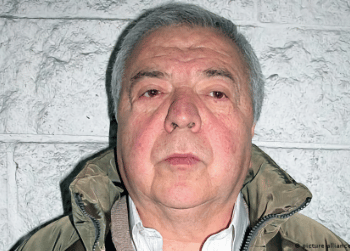The death of Cali Cartel boss Gilberto Rodríguez Orejuela in a US prison marks the end of one of Colombia’s most notorious drug lords – and a bygone era.
News of Rodríguez Orejuela’s death at a federal prison in North Carolina was confirmed by family members on the morning of June 1, El Tiempo reported.
Once the leader of the infamous Cali Cartel based in western Colombia, Rodríguez Orejuela had been serving a 30-year prison sentence for drug trafficking. Colombian authorities first arrested him in 1995 in his luxurious home in Cali. At the time, the US Drug Enforcement Administration (DEA) estimated that the Cali Cartel accounted for 80 percent of the global supply of cocaine, according to the New York Times.
SEE ALSO: Has Cali Become an Operational Hub for Mexican Cartels in Colombia?
Despite receiving a 15-year sentence, he was released in 2002 on a controversial judicial ruling that cut the sentence in half due to Rodríguez Orejuela’s participation in work-study programs and good behavior, according to The Guardian. He was rearrested in 2004.
By that time, the US government had already succeeded in pressuring the Colombian government to lift its ban on extraditing its citizens. Rodríguez Orejuela was sent to the US after being accused of maintaining criminal operations from behind bars. The US Department of Justice heralded his capture and guilty plea as “a final and fatal blow to the Cali Cartel,” demonstrating to “drug traffickers and kingpins around the world that now, they are not beyond the reach of the United States.”
At 83, Rodríguez Orejuela had spent the past few months battling numerous health issues and, according to Infobae, was bedridden in the final weeks of his life.
One of Colombia’s most infamous capos, Orejuela is survived by his brother and Cali Cartel associate, Miguel Rodríguez.
InSight Crime Analysis
Gilberto Rodríguez Orejuela built his cocaine empire with a precision that earned him the alias “El Ajedrecista,” (The Chess Player), consolidating the Cali Cartel into the most powerful top-down cocaine trafficking group in the world. He was one of the last remaining capos of a bygone era, leaving behind a splintered criminal underworld. His relatively low profile – at least compared with his adversary Pablo Escobar – would serve as a template for Colombia’s drug traffickers to follow.
Based in the western Valle del Cauca department, the Cali Cartel became Colombia’s dominant trafficking force after the 1993 death of Pablo Escobar decapitated the Medellín Cartel. The brothers trafficked hundreds of tons of cocaine into the US, primarily to feed northeastern markets like New York City, though they also supplied markets in Europe.
The organization initially collaborated with the Medellín Cartel, divvying up cocaine markets in the US. The Cali Cartel, however, soon turned on Escobar and supported a paramilitary group that targeted his organization.
SEE ALSO: Profile of Norte del Valle Cartel
With Escobar’s eventual demise, the Cali cartel maintained control over the cocaine trade before combined efforts from Colombian and US authorities set about dismantling it in the late 1990s. Rodríguez Orejuela departed from Escobar’s brash, murderous, public style while in power. That’s not to say Orejuela wasn’t violent; Cali Cartel gunmen carried out killings in Miami and New York, in addition to the infamous 1998 attack on Medellin’s Monaco apartment building, where a car bomb went off with Escobar and his wife inside. Journalist Manuel de Dios Unanue was murdered on the orders of the Cali Cartel because of his articles about the group.
In 2006, Rodríguez Orejuela and his associates cut a deal with US authorities granting immunity for their family members in exchange for handing over the entirety of their drug trafficking fortune.
What followed the organization’s rupture was a splintering of the country’s criminal landscape that is still evident to this day.
After Escobar’s death, Colombia experienced a sharp drop in homicides and a degree of criminal order brought on in part by Orejuela’s preference for a more subtle approach to narco-trafficking. However, the fragmentation that resulted from the Cali Cartel’s demise was far messier. The Norte del Valle Cartel (NDVC) formed out of remnant trafficking networks, but the organization was prone to factionalism and continued bloody conflict. Roughly 20 years after Rodríguez Orejuela’s imprisonment, offshoots of the NDVC continued to battle each other violently.
Beyond criminal fragmentation, Rodríguez Orejuela’s Cali Cartel leaves behind a legacy of high-profile corruption on top of integration between licit and illicit businesses in Colombia and abroad. Rodríguez Orejuela and his brother came to control banks in Panama and Colombia.
During the 1990s, over 300 individuals and entities were sanctioned by the US Treasury Department for ties to the Cali Cartel. Authorities fingered the Colombian drugstore chain La Rebaja as a money laundering front for the cartel, and the professional soccer team America de Cali was sanctioned by US officials, as it had been owned by the brothers and allegedly was unable to break ties with its criminal roots.
The Cali Cartel perfected the art of corruption, favoring a strategy of bribery that allowed the brothers to buy off public officials in multiple Latin American nations. The brothers are even alleged to have provided campaign financing to former Colombian presidents Ernesto Samper and Andrés Pastrana, according to the media outlet Semana.

